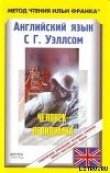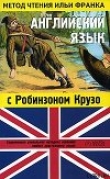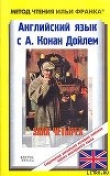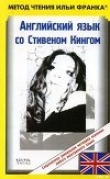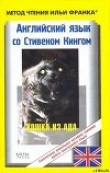
Текст книги "Английский язык с Агатой Кристи. Убийства по алфавиту"
Автор книги: Илья Франк
Соавторы: Agatha Christie,Евгения Мерзлякова
Жанры:
Языкознание
,сообщить о нарушении
Текущая страница: 8 (всего у книги 39 страниц) [доступный отрывок для чтения: 14 страниц]
сache [kæʃ], measure [ˈmeʒǝ], evidence [ˈevɪdǝns]
«My friend, we are in the peculiar position of not knowing what questions to ask. We are like little children playing Cache Cache in the dark. We stretch out our hands and grope about. Mrs. Fowler has told us all that she thinks she knows – and has thrown in several conjectures for good measure! In the future, however, her evidence may be useful. It is for the future that I have invested that sum of five pounds.»
I did not quite understand the point, but at this moment we ran into Inspector Glen.
VII. Mr. Partridge and Mr. Riddell
(мистер Партридж и мистер Риддел)
Inspector Glen was looking rather gloomy (инспектор Глен выглядел довольно мрачным). He had, I gathered (он, как я понял; to gather – собираться; делать вывод), spent the afternoon (провел день; to spend – проводить) trying to get a complete list of persons (пытаясь получить полный список лиц) who had been noticed entering the tobacco shop (которые были замечены входящими в табачный магазин).
"And nobody has seen anyone?" Poirot inquired (и никто никого /не/ видел? – осведомился Пуаро).
"Oh, yes (о, да), they have (они /видели/). Three tall men with furtive expressions (трех высоких людей с вороватым выражением /лица/; furtive – хитрый; вороватый) four short men with black moustaches (четырех невысоких мужчин с черными усами) – two beards (двух бородатых: «две бороды») – three fat men (трех толстых людей) – all strangers (все незнакомцы) – and all (и все), if I'm to believe witnesses (если я должен верить свидетелям), with sinister expressions (со зловещими выражениями /лиц/)! I wonder (мне интересно, /почему/) somebody didn't see a gang of masked men with revolvers (кто-нибудь не увидел банду людей в масках с револьверами) while they were about it (пока они были поблизости; to be about)!"
Poirot smiled sympathetically (Пуаро сочувственно улыбнулся; sympathy – сочувствие; симпатия). "Does anybody claim to have seen the man Ascher (кто-нибудь заявил, что видел этого человека, Эшера)?"
furtive [ˈfǝ:tɪv], sinister [ˈsɪnɪstǝ], sympathetically [ˌsɪmpǝˈƟetɪkǝlɪ]
Inspector Glen was looking rather gloomy. He had, I gathered, spent the afternoon trying to get a complete list of persons who had been noticed entering the tobacco shop.
"And nobody has seen anyone?" Poirot inquired.
"Oh, yes, they have. Three tall men with furtive expressions four short men with black moustaches – two beards – three fat men – all strangers – and all, if I'm to believe witnesses, with sinister expressions! I wonder somebody didn't see a gang of masked men with revolvers while they were about it!"
Poirot smiled sympathetically. "Does anybody claim to have seen the man Ascher?"
"No, they don't (нет, никто). And that's another point in his favour (и это еще одно очко в его пользу). I've just told the Chief Constable (я только что сказал начальнику полиции: «главному констеблю») that I think (что я думаю) this is a job for Scotland Yard (это работа для Скотланд-Ярда). I don't believe (я не верю) it's a local crime (что это преступление местного /значения/)."
Poirot said gravely (Пуаро серьезно сказал): "I agree with you (я согласен с вами)."
The inspector said: "You know, Monsieur Poirot (вы знаете, мсье Пуаро), it's a nasty business (это отвратительное дело) – a nasty business). I don't like it (мне оно не нравится)."
We had two more interviews (мы провели еще две беседы) before returning to London (прежде чем вернулись в Лондон).
The first was with Mr. James Partridge (первая была с мистером Партриджем). Mr. Partridge was the last person known (мистер Партридж был последним человеком /кто, как/ известно) to have seen Mrs. Ascher alive (видел миссис Эшер живой). He had made a purchase from her at 5:30 (он сделал у нее покупку в половине шестого).
constable [ˈkʌnstǝbl], job [ʤɔb], alive [ǝˈlaɪv]
«No, they don't. And that's another point in his favour. I've just told the Chief Constable that I think this is a job for Scotland Yard. I don't believe it's a local crime.»
Poirot said gravely: "I agree with you."
The inspector said: "You know, Monsieur Poirot, it's a nasty business – a nasty business. I don't like it."
We had two more interviews before returning to London.
The first was with Mr. James Partridge. Mr. Partridge was the last person known to have seen Mrs. Ascher alive. He had made a purchase from her at 5:30.
Mr. Partridge was a small (мистер Партридж был маленький), spare man (скромный человек; spare – запасной; скромный; худощавый), a bank clerk by profession (банковский клерк по профессии). He wore pince-nez (он носил пенсне), was very dry (был очень сухощавый; dry – сухой; сдержанный) and spare-looking (и худощавый) and extremely precise in all his utterances (и крайне точный в своих выражениях). He lived in a small house (он жил в маленьком доме) as neat and trim as himself (таком же опрятном и аккуратном, как он сам).
"Mr. (мистер) – er (э) – Poirot (Пуаро)," he said, glancing at the card (глядя на карточку) my friend had handed to him (/которую/ мой друг передал ему). "From Inspector Glen (от инспектора Глена)? What can I do for you, Mr. Poirot (что я могу сделать для вас, мистер Пуаро)?"
"I understand, Mr. Partridge (/как/ я понимаю, мистер Партридж), that you were the last person to see Mrs. Ascher alive (что вы были последним человеком, /который/ видел миссис Эшер живой)."
Mr. Partridge placed his fingertips together (мистер Партридж сложил кончики пальцев вместе; to place – размещать; класть) and looked at Poirot (и посмотрел на Пуаро) as though he were a doubtful cheque (как будто он был сомнительным /банковским/ чеком; to doubt – сомневаться).
pince-nez [ˈpænsneɪ], precise [prɪˈsaɪz], cheque [tʃek]
Mr. Partridge was a small, spare man, a bank clerk by profession. He wore pince-nez, was very dry and spare-looking and extremely precise in all his utterances. He lived in a small house as neat and trim as himself.
"Mr. – er – Poirot," he said, glancing at the card my friend had handed to him. "From Inspector Glen? What can I do for you, Mr. Poirot?"
"I understand, Mr. Partridge, that you were the last person to see Mrs. Ascher alive."
Mr. Partridge placed his fingertips together and looked at Poirot as though he were a doubtful cheque.
«That is a very debatable point, Mr. Poirot,» he said (это очень спорное утверждение, мистер Пуаро; to debate – обсуждать; спорить). "Many people may have made purchases from Mrs. Ascher (много людей, вероятно, делали покупки у миссис Эшер) after I did so (после того, как /их/ сделал я)."
"If so (если так), they have not come forward to say so (они не заявили об этом; to come forward – выходить; выступать с заявлением)."
Mr. Partridge coughed (мистер Партридж кашлянул). "Some people, Mr. Poirot (некоторые люди, мистер Пуаро), have no sense of public duty (/не/ имеют никакого чувства общественного долга)."
He looked at us owlishly through his spectacles (он по-совиному посмотрел на нас сквозь очки; owl – сова).
"Exceedingly true," murmured Poirot (совершенно верно: «чрезвычайно правдиво» —пробормотал Пуаро; to exceed – превышать; превосходить). "You, I understand (вы, /как/ я понимаю), went to the police of your own accord (пошли в полицию добровольно: «по собственной воле»; accord – одобрение; согласие)?"
owlishly [ˈaʋlɪʃlɪ], exceedingly [ɪkˈsi:dɪŋlɪ], accord [ǝˈkɔ:d]
«That is a very debatable point, Mr. Poirot,» he said. «Many people may have made purchases from Mrs. Ascher after I did so.»
"If so, they have not come forward to say so."
Mr. Partridge coughed. "Some people, Mr. Poirot, have no sense of public duty."
He looked at us owlishly through his spectacles.
"Exceedingly true," murmured Poirot. "You, I understand, went to the police of your own accord?"
"Certainly I did (конечно, я сделал /так/). As soon as I heard of the shocking occurrence (как только я услышал о шокирующем происшествии) I perceived (я понял) that my statement might be helpful (что мое заявление может быть полезным) and came forward accordingly (и соответственно заявил).''
"A very proper spirit," said Poirot solemnly (очень надлежащий настрой, – сказал Пуаро торжественно; proper – надлежащий; правильный; подходящий; spirit – дух, душа; образ мышления; настроение). "Perhaps you will be so kind as to repeat your story to me (возможно, вы будете так любезны, чтобы повторить мне вашу историю)."
"By all means (пожалуйста/конечно: «всеми способами»). I was returning to this house (я возвращался к этому дому) and at 5:30 precisely (и, точно в половине шестого) —"
"Pardon (прошу прощения), how was it that you knew the time so accurately (как это так /получилось/, что вы так точно знаете время; to know; accurate – верный, правильный, точный)?"
might [maɪt], pardon [ˈpɑ:d(ǝ)n], accurately [ˈækjurǝtlɪ]
"Certainly I did. As soon as I heard of the shocking occurrence I perceived that my statement might be helpful and came forward accordingly.''
"A very proper spirit," said Poirot solemnly. "Perhaps you will be so kind as to repeat your story to me."
"By all means. I was returning to this house and at 5:30 precisely —"
"Pardon, how was it that you knew the time so accurately?"
Mr, Partridge looked a little annoyed at being interrupted (мистер Партридж выглядел несколько раздосадованным тем, что его прервали; to annoy – досаждать; докучать). "The church clock chimed (церковные часы пробили). I looked at my watch (я посмотрел на свои часы) and found I was a minute slow (и обнаружил, что мои на минуту отстают; slow – медленный). That was just before I entered Mrs. Ascher's shop (это было перед тем, как я зашел в магазин миссис Эшер)."
"Were you in the habit of making purchases there (у вас была привычка делать там покупки)?"
"Fairly frequently (достаточно часто; frequent – частый; повторяющийся). It was on my way home (это было мне по дороге домой). About once or twice a week (раз или два в неделю: «около одного или двух раз в неделю») I was in the habit of purchasing two ounces[10]10
Ounce – унция (= 28,3 г).
[Закрыть] of John Cotton mild (я привык покупать две унции /табаку/ «Джон Коттона», некрепкого; mild – мягкий; некрепкий)."
annoy [ǝˈnɔɪ], frequently [ˈfrɪkwǝntlɪ], ounce [aʋns]
Mr, Partridge looked a little annoyed at being interrupted. «The church clock chimed. I looked at my watch and found I was a minute slow. That was just before I entered Mrs. Ascher's shop.»
"Were you in the habit of making purchases there?"
"Fairly frequently. It was on my way home. About once or twice a week I was in the habit of purchasing two ounces of John Cotton mild."
"Did you know Mrs. Ascher at all (вы вообще знали миссис Эшер)? Anything of her circumstances or her history (что-нибудь о ее обстоятельствах или ее истории /жизни/)?"
"Nothing whatever (абсолютно ничего; whatever – в отрицательных предложениях и с отрицательным смыслом никакой, совсем не, вообще не). Beyond my purchase (кроме моих покупок) and an occasional refill as to the state of the weather (и случайной фразы, как /например/ о состоянии погоды; refill – пополнение, добавление), I had never spoken to her (я никогда с ней /не/ разговаривал)."
"Did you know she had a drunken husband (вы знали, что у нее был пьяница-муж) who was in the habit of threatening her life (который привык угрожать ей; habit – привычка)?"
"No, I knew nothing whatever about her (я абсолютно ничего /не/ знал о ней)."
"You knew her by sight, however (вы знали ее внешне, однако). Did anything about her appearance strike you as unusual yesterday evening (вам показалось что-то необычным в ее внешности вчера вечером: «что-нибудь в ее внешности поразило вас как необычное вчера вечером»; to strike – ударять; поражать, производить впечатление)? Did she appear flurried (выглядела ли она взволнованной; to flurry – волновать, будоражить) or put out in any way (или обеспокоенной каким-то образом; to put out – разг. беспокоить)?"
Mr. Partridge considered (мистер Партридж подумал). "As far as I noticed (насколько я заметил), she seemed exactly as usual," he said (она казалась точно такой же, как обычно).
circumstance [ˈsǝ:kǝmstǝns], occasional [ǝˈkeɪʒ(ǝ)nǝl], appearance [ǝˈpɪǝrǝns]
«Did you know Mrs. Ascher at all? Anything of her circumstances or her history?»
"Nothing whatever. Beyond my purchase and an occasional refill as to the state of the weather, I had never spoken to her."
"Did you know she had a drunken husband who was in the habit of threatening her life?"
"No, I knew nothing whatever about her."
"You knew her by sight, however. Did anything about her appearance strike you as unusual yesterday evening? Did she appear flurried or put out in any way?"
Mr. Partridge considered. "As far as I noticed, she seemed exactly as usual," he said.
Poirot rose (Пуаро встал).
"Thank you, Mr. Partridge (благодарю вас, мистер Партридж), for answering these questions (что ответили на эти вопросы). Have you, by any chance (нет ли у вас случайно), an A.B.C. in the house (/железнодорожного справочника/ «Эй-би-си» дома)? I want to look up my return train to London (я хочу посмотреть мой поезд назад в Лондон; to return – возвращаться)."
"On the shelf just behind you," said Mr. Partridge (на полке сразу позади вас).
On the shelf in question were an A.B.C. (на указанной полочке был /железнодорожный справочник/ «Эй-би-си»), a Bradshaw (Брадшо), the Stock Exchange[11]11
Stock Exchange – Лондонская фондовая биржа (основана в 1773; современное двадцатишестиэтажное здание построено в 1970; Royal Exchange).
[Закрыть] Year Book (ежегодник фондовой биржи: «годовая книга фондовой биржи»), Kelly's Directory[12]12
Kelly's – «Келлиз» (серия адресных книг разных городов Великобритании) по названию издательства «Келлиз директориз» (Kelly's Directories).
[Закрыть](справочник «Келлиз»), a Who's Who[13]13
Who's Who – «Кто есть кто» (название справочника, содержащего биографическую информацию о современниках).
[Закрыть](/биографический справочник/ «Кто есть кто») and a local directory (и местный справочник).
Poirot took down the A.B.C. (Пуаро снял /с полки/ «Эй-би-си»), pretended to look up a train (сделал вид, что смотрит там поезд; to pretend – притворяться), then thanked Mr. Partridge (затем поблагодарил мистера Партриджа) and took his leave (и попрощался; to take one's leave – уходить; прощаться).
behind [bɪˈhaɪnd], exchange [ɪksˈtʃeɪnʒ], pretend [prɪˈtend]
Poirot rose.
"Thank you, Mr. Partridge, for answering these questions. Have you, by any chance, an A.B.C. in the house? I want to look up my return train to London."
"On the shelf just behind you," said Mr. Partridge.
On the shelf in question were an A.B.C., a Bradshaw, the Stock Exchange Year Book, Kelly's Directory, a Who's Who and a local directory.
Poirot took down the A.B.C., pretended to look up a train, then thanked Mr. Partridge and took his leave.
Our next interview was with Mr. Albert Riddell (наша следующая беседа была с мистером Альбертом Ридделом) and was of a highly different character (и была совершенно иного характера). Mr. Albert Riddell was a plate-layer (мистер Альберт Риддел был путевым рабочим/работал на укладке рельсов) and our conversation took place to the accompaniment of the clattering of plates and dishes (и наша беседа проходила под аккомпанемент громыхания тарелок и посуды) by Mr. Riddell's obviously nervous wife (/производимого/, очевидно, нервной женой мистера Риддела), the growling of Mr. Riddell's dog (рычание собаки мистера Риддела) and the undisguised hostility of Mr. Riddell himself (и неприкрытой враждебности самого мистера Риддела; to disguise – изменять внешность, облик; переодевать; маскировать; утаивать, скрывать).
He was a big clumsy giant of a man (он был большой неуклюжий великан) with a broad face (с широким лицом) and small suspicious eyes (и маленькими недоверчивыми глазами). He was in the act of eating a meat pie (он как раз ел мясной пирог: «он был в процессе поедания мясного пирога»), washed down by exceedingly black tea (запиваемый чрезвычайно крепким чаем: «черным чаем»; to wash down – вымыть, смыть; запивать). He peered at us angrily over the rim of his cup (он злобно на нас уставился через край своей чашки; to peer – вглядываться, вперять взгляд).
accompaniment [ǝˈkʌmpǝnɪmǝnt], giant [ˈʤaɪǝnt], peer [pɪǝ]
Our next interview was with Mr. Albert Riddell and was of a highly different character. Mr. Albert Riddell was a plate-layer and our conversation took place to the accompaniment of the clattering of plates and dishes by Mr. Riddell's obviously nervous wife, the growling of Mr. Riddell's dog and the undisguised hostility of Mr. Riddell himself.
He was a big clumsy giant of a man with a broad face and small suspicious eyes. He was in the act of eating a meat pie, washed down by exceedingly black tea. He peered at us angrily over the rim of his cup.
"Told all I've got to tell once, haven't I (рассказал все, что имел сказать, сразу, не так ли)?" he growled (зарычал он). "What's it to do with me, anyway (что это имеет общего со мной, так или иначе)? Told it to the blasted police, I 'ave (рассказал это чертовой полиции, уже; to blast – разрушать; оглушать; ругаться; 'ave – have), and now I've got to spit it all out again to a couple of blasted foreigners (и теперь мне приходится снова все это выкладывать парочке чертовых иностранцев; to spit it out – разг. выкладывать, говорить; to spit – плевать)."
Poirot gave a quick amused glance in my direction (Пуаро бросил быстрый позабавленный взгляд в моем направлении; to amuse – забавлять, развлекать) and then said (и затем сказал): "In truth (поистине) I sympathize with you (я вам сочувствую), but what will you (но что вы)? It is a question of murder (речь идет об убийстве: «это вопрос убийства»), is it not (не так ли)? One has to be very, very careful (приходится быть очень, очень осторожным)."
"Best tell the gentleman (лучше скажи джентельмену) what he wants, Bert (что он хочет, Берт)," said the woman nervously (нервно сказала женщина).
"You shut your blasted mouth," roared the giant (/а/ ты закрой свой чертов рот, – взревел великан).
"You did not (вы не), I think (я думаю), go to the police of your own accord (ходили в полицию по собственной воле)." Poirot slipped the remark in neatly (Пуаро ловко вставил замечание).
"Why the hell should I (какого черта я бы /пошел/)? It were no business of mine (это было не мое дело)."
blasted [ˈblɑ:stɪd], couple [kʌpl], own [ǝʋn]
«Told all I've got to tell once, haven't I?» he growled. «What's it to do with me, anyway? Told it to the blasted police, I 'ave, and now I've got to spit it all out again to a couple of blasted foreigners.»
Poirot gave a quick amused glance in my direction and then said: "In truth I sympathize with you, but what will you? It is a question of murder, is it not? One has to be very, very careful."
"Best tell the gentleman what he wants, Bert," said the woman nervously.
"You shut your blasted mouth," roared the giant.
"You did not, I think, go to the police of your own accord." Poirot slipped the remark in neatly.
"Why the hell should I? It were no business of mine."
«A matter of opinion,» said Poirot indifferently (дело в точке зрения, – сказал Пуаро безразлично; to differ – отличаться). "There has been a murder (произошло: «там было» убийство) – the police want to know (полиция хочет знать) who has been in the shop (кто был в магазине), I myself think it would have (я сам думаю, это бы) – what shall I say (как мне сказать)? – looked more natural (выглядело более естественным) if you had come forward (если бы вы сами заявили)."
"I've got my work to do (у меня работа: «у меня есть моя работа, чтобы делать»). Don't say I shouldn't have come forward in my own time (не должен же я заявлять в мое собственное /рабочее/ время) —"
"But as it was (но, как это было = вышло иначе), the police were given your name (полиции дали ваше имя) as that of a person seen to go into Mrs. Ascher's (как /имя/ человека, /которого/ видели входящим в /магазин/ миссис Эшер) and they had to come to you (и им пришлось прийти к вам). Were they satisfied with your account (были ли они удовлетворены на ваш счет)?"
"Why shouldn't they be?" demanded Bert truculently (с чего бы им не быть, – свирепо спросил Берт; truculent – жестокий, свирепый).
Poirot merely shrugged his shoulders (Пуаро просто пожал плечами).
natural [ˈnætʃǝrǝl], account [ǝˈkaʋnt], truculently [ˈtrʌkjulǝntlɪ]
«A matter of opinion,» said Poirot indifferently. «There has been a murder – the police want to know who has been in the shop, I myself think it would have – what shall I say? – looked more natural if you had come forward.»
"I've got my work to do. Don't say I shouldn't have come forward in my own time —"
"But as it was, the police were given your name as that of a person seen to go into Mrs. Ascher's and they had to come to you. Were they satisfied with your account?"
"Why shouldn't they be?" demanded Bert truculently.
Poirot merely shrugged his shoulders.
"What are you getting at, mister (на что вы намекаете, мистер; to get at – намекать)? Nobody's got anything against me (ни у кого против меня ничего /нет/)! Everyone knows who did the old girl in (все знают, кто прикончил эту старуху: «старую девочку»), that b (этот ч…) – of a husband of hers (муж ее)."
"But he was not in the street that evening (но он не был на улице в тот вечер) and you were (а вы были)."
"Trying to fasten it on me are you (пытаетесь мне пришить это, вы; to fasten – укрепить, привязать)? Well (ну), you won't succeed (у вас не выйдет; to succeed – следовать; преуспевать). What reason had I got to do a thing like that (по какой причине я должен совершать подобное: «вещь как эта»)? Think I wanted to pinch a tin of her bloody tobacco (думаете, я хотел стащить банку ее чертового табаку; to pinch – щипать, ущипнуть; сл. красть)? Think I'm a bloody homicidal maniac (думаете, я чертов маньяк-убийца; homicide – убийство) as they call it (как это называют)? Think I (думаете я) —?"
succeed [sǝkˈsi:d], homicidal [ˌhɔmɪˈsaɪd(ǝ)l], maniac [ˈmeɪnɪæk]
«What are you getting at, mister? Nobody's got anything against me! Everyone knows who did the old girl in, that b – – of a husband of hers.»
"But he was not in the street that evening and you were."
"Trying to fasten it on me are you? Well, you won't succeed. What reason had I got to do a thing like that? Think I wanted to pinch a tin of her bloody tobacco? Think I'm a bloody homicidal maniac as they call it? Think I – ?"
He rose threateningly from his seat (он угрожающе встал со своего места; to threat). His wife bleated out (его жена проблеяла): "Bert (Берт), Bert – don't say such things (не говори так: «таких вещей»). Bert (Берт) – they'll think (они подумают) —"
"Calm yourself, Monsieur," said Poirot (успокойтесь, мсье). "I demand only your account of your visit (мне нужен только рассказ о вашем визите: «отчет о вашем визите»; to demand – требовать; нуждаться). That you refuse (/то/, что вы отказываетесь) it seems to me (кажется мне) – what shall we say (как мы можем сказать) – a little odd (немного странным)?"
"Who said (кто сказал) I refused anything (что я отказываюсь от чего-то)?" Mr. Riddell sank back again into his seat (мистер Риддел снова откинулся на своем месте). "I don't mind (я не возражаю)."
"It was six o'clock (было шесть часов) when you entered the shop (когда вы зашли в магазин)?"
bleat [bli:t], calm [kɑ:m], refuse [rɪˈfju:z]
He rose threateningly from his seat. His wife bleated out: "Bert, Bert – don't say such things. Bert – they'll think – "
"Calm yourself, Monsieur," said Poirot. «I demand only your account of your visit. That you refuse it seems to me – what shall we say – a little odd?»
"Who said I refused anything?" Mr. Riddell sank back again into his seat. "I don't mind."
"It was six o'clock when you entered the shop?"
"That's right (это правильно) – a minute or two after (минута или две /седьмого/), as a matter of fact (фактически). Wanted a packet of Gold Hake (хотел пачку «Голд Хейк» /«золотого хека»/). I pushed open the door (я толкнул дверь, чтобы открыть) —"
"It was closed, then (значит, она была закрыта)?"
''That's right (это точно). I thought (я подумал) the shop was shut, maybe (что магазин был, наверное, закрыт). But it wasn't (но он не был). I went in (я зашел внутрь), there wasn't anyone about (там не было никого вокруг). I hammered on the counter (я постучал по прилавку; to hammer – бить; колотить) and waited a bit (и подождал немного). Nobody came (никто /не/ пришел), so I went out again (так я опять вышел). That's all (это все), and you can put it in your pipe and smoke it (и зарубите себе это на носу: «и вы можете забить это себе в трубку выкурить»; to put it in your pipe and smoke it – зарубить на носу)."
gold [ɡǝʋld], hammer [ˈhæmǝ], pipe [paɪp]
«That's right – a minute or two after, as a matter of fact. Wanted a packet of Gold Hake. I pushed open the door —»
"It was closed, then?"
''That's right. I thought the shop was shut, maybe. But it wasn't. I went in, there wasn't anyone about. I hammered on the counter and waited a bit. Nobody came, so I went out again. That's all, and you can put it in your pipe and smoke it."
"You didn't see the body fallen down behind the counter (вы не видели тело, упавшее за прилавок; to fall – падать)?"
"No, no more would you have done (и вы бы не увидели: «не более, чем вы бы сделали») – unless you was looking for it, maybe (разве что если бы вы искали его, может быть)."
"Was there a railway guide lying about (там где-нибудь лежал железнодорожный справочник: «был там где-нибудь лежащий железнодорожный справочник»)?"
"Yes, there was (да, был) – face downwards (вверх обложкой: «вниз лицом»). It crossed my mind (мне пришло в голову: «это пересекло мой ум») like that the old woman might have had to go off sudden by train (как что старухе, наверное, неожиданно пришлось уехать на поезде) and forgot to lock shop up (и /она/ забыла закрыть магазин; to forget)."
"Perhaps you picked up the railway guide (возможно, вы поднимали железнодорожный справочник) or moved it along the counter (или передвигали его по прилавку)?"
"Didn't touch the b – – thing (не трогал эту ч… вещь). I did just what I said (я только сделал то, что я сказал)."
fallen [ˈfɔ:l(ǝ)n], sudden [sʌdn], touch [tʌtʃ]
«You didn't see the body fallen down behind the counter?»
"No, no more would you have done – unless you was looking for it, maybe."
"Was there a railway guide lying about?"
"Yes, there was – face downwards. It crossed my mind like that the old woman might have had to go off sudden by train and forgot to lock shop up."
"Perhaps you picked up the railway guide or moved it along the counter?"
"Didn't touch the b – – thing. I did just what I said."
"And you did not see anyone (и вы не видели кого-нибудь) leaving the shop (выходящим из магазина) before you yourself got there (перед тем, как вы сами туда вошли)?"
"Didn't see any such thing (не видел ничего такого: «какой-нибудь такой вещи»). What I say is (что я говорю это), why pitch on me (зачем мне докучать; to pitch on – останавливаться на ком-то; докучать)."
Poirot rose (Пуаро поднялся).
"Nobody is pitching upon you (никто вам /не/ докучает) – yet (пока). Bon soir, Monsieur(фр. доброго вечера, мсье)."
He left the man with his mouth open (он оставил мужчину /сидеть/ с открытым ртом; to leave) and I followed him (и я последовал за ним).
In the street he consulted his watch (на улице он посмотрел на часы). "With great haste, my friend (/если/ поспешим: «с большой спешкой», мой друг), we might manage to catch the train (нам, вероятно, удастся успеть на поезд). Let us dispatch ourselves quickly (давайте быстро отправляться)."
pitch [pɪtʃ], haste [heɪst], dispatch [dɪsˈpætʃ]
«And you did not see anyone leaving the shop before you yourself got there?»
"Didn't see any such thing. What I say is, why pitch on me."
Poirot rose.
"Nobody is pitching upon you – yet. Bon soir, Monsieur."
He left the man with his mouth open and I followed him.
In the street he consulted his watch. "With great haste, my friend, we might manage to catch the train. Let us dispatch ourselves quickly."

